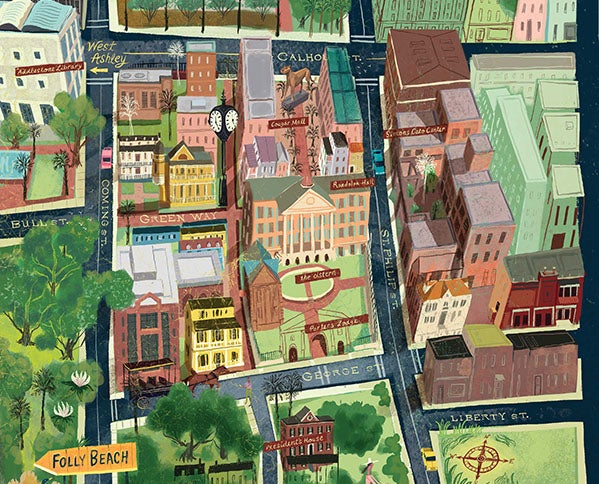Last spring, a group of faculty and staff at the College developed a new website that seeks to tell a fuller story of the school’s long and complex history. But just as the team was gearing up for the site’s public launch, the coronavirus pandemic hit and classes moved online. Initially, it seemed the unveiling would have to wait. As it turned out, the school’s pivot to online learning proved to be the ideal environment in which to announce the new website.
Unveiled in April 2020, Discovering Our Past was created as part of the College’s 250th anniversary. It includes multimedia essays on iconic locations such as Randolph Hall, the Cistern Yard and Porter’s Lodge, but it also features historic houses with pasts that are not as well-known, including structures on Green Way, College Way and St. Philip Street. Each essay is accompanied by historical images, audio recordings, drawings, documents and maps, as well as contemporary photos.
The website includes a mobile app for Apple and Android smartphones. The anniversary’s Historical Documentation Committee – whose members are English Professor Julia Eichelberger, Addlestone Library Scholar-in-Residence Harlan Greene and Vice President of Communications Ron Menchaca – conducted all the research and writing for the site. The committee’s research assistants are graduate history student Grayson Harris, senior English major Keyasia Pride, senior political science and history double-major Erik Cronell and Charleston researcher Sarah Fick. Joy Vandervort-Cobb, an associate professor of theatre and in-demand voiceover artist, voiced the audio versions of the essays.
Several of the essays include details about the College and its people that have been historically under-recognized, misunderstood or ignored. “This has afforded us an excellent opportunity to not just add the stories of those left out, but to verify, as an academic institution should, the veracity of versions of the past that have come down to us,” says Greene.
Eichelberger says the original idea for the website stemmed from a recognition of the need for a historical tour of campus that would complement tours conducted by the Office of Admissions, which are designed to introduce visitors to the experiences and opportunities that CofC currently offers its students.
“We were missing an opportunity to tell our full story to the public,” says Eichelberger. “We’ve always been more than our historic structures; we’ve been part of a city whose social history is diverse and complex.”
To expand the site’s offerings, the creators are now partnering with CofC academic units to showcase student-produced content. Working in collaboration with the Center for the Study of Slavery in Charleston (CSSC), Rachel Donaldson’s graduate students researched and wrote a series of thematic tours focusing on the history of slavery and its enduring legacies in the City of Charleston.
“Our work is part of current efforts to uncover, document and interpret the history and legacy of slavery in the cultural landscape of the College of Charleston and its surrounding neighborhoods,” says Donaldson, assistant professor of history.
Aaisha Haykal, chair of the CSSC Public History Working Group and manager of archival services at the Avery Research Center for African American History and Culture, says working with the students on their research was a wonderful experience that she hopes will expose the center’s records to a larger audience.
“The project met two needs: increasing awareness of Charleston’s underrepresented histories as well as fostering an understanding of how historical documents and images can help us understand the past, present and future,” says Haykal.
Since the site’s launch, the Black Lives Matter movement has created even more urgency to make Black lives more visible to everyone, and the student essays are a step toward this goal.
Says Eichelberger: “To fulfill our current mission as an inclusive and welcoming institution, we must tell all the stories of our shared past.”
Illustration by Tim Banks




